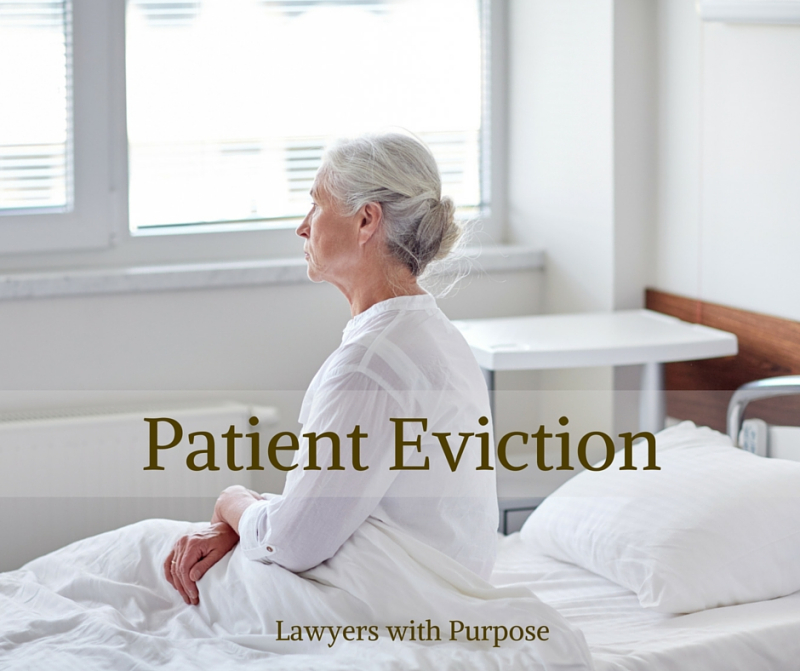Patient eviction is a growing problem in our country. Between 2000 and 2014, national Ombudsman programs report that eviction complaints are up 57 percent, despite the number of nursing home patients being slightly down. And the correlation between the growth of dementia and the eviction of patients seems clear. Knowing our state discharge procedures, appellate rights and care requirements is essential to us as elder care attorneys. Our understanding of patient rights and legal protections, along with a phone call to a facility, can often go further than anything a family can do.
Financial Abuse of Elders & Other At Risk Adults – Part Seven
The Crime of the 21st Century
The federal Older Americans Act mandates the establishment of a Long-Term Care Ombudsman (“LTCO”) program in all 50 states and the District of Columbia. (The term “ombudsman” is Swedish for “citizen’s representative.”) The LTCO is “dedicated to enhancing the lives of long-term care residents through advocacy, education and resolution of resident complaints, including those related to abuse, neglect and exploitation.”
See NCEA site at http://ncea.aoa.gov/Stop_Abuse/Partners/LTC_Ombudsman/index.aspx.
Included in the scope of long-term care facilities subject to LTCO oversight are the following.
· Skilled nursing facilities (“nursing homes”).
· Assisted living facilities.
· “Board and care” homes (often referred to as “personal care homes” or “host homes”).
· Intermediate care facilities for those with intellectual disabilities.
· Other community living arrangements (e.g. group homes).
 See National Long-Term Care Ombudsman Resource Center website http://www.ltcombudsman.org/about-ombudsmen.
See National Long-Term Care Ombudsman Resource Center website http://www.ltcombudsman.org/about-ombudsmen.
The LTCO program is usually operated under the auspices of the “State Unit on Aging” or local “Areas on Aging,” which are part of the “Aging Services Network” mandated by the Older Americans Act and developed by the U.S. Department of Health and Human Services (“HHS”) Administration on Aging (“AoA”). In April 2012, HHS established the Administration for Community Living, which consolidated the AoA, the Office on Disability, and the Administration on Developmental Disabilities.
Complaints to the LTCO may be initiated by a call to the State Unit on Aging, the Regional Area Agency on Aging, or State LTCO Office, by either the resident herself, or on behalf of the resident by a friend, family member or other third party. The NCEA maintains a database of all state LTCO contacts (state, regional and local), which can be accessed by calling the Elder Care Locator service at 1-800-677-1116 during regular business hours, or by visiting http://www.ltcombudsman.org/ombudsman. Residents can also initiate a complaint in person when LTCO staff make periodic site visits to the facilities in their jurisdiction.
Complaints of residents are informally investigated by LTCO personnel and resolved, if possible, by informal techniques such as mediation, conciliation, and persuasion. If the complaint is not resolved informally, or if the nature of the complaint is so serious that it requires the involvement of a regulatory agency or law enforcement (e.g. alleged physical or sexual abuse or licensing violations), the matter is referred to the appropriate agency for formal investigation and resolution. LTCO staff will engage in the necessary follow-up to assure that the formal investigation proceeds towards resolution of the resident’s complaint.
All complaints lodged with the LTCO must be kept confidential, unless the resident authorizes the release of her name. It is against the law for a facility to retaliate or discriminate against a resident for making a complaint to the LTCO. Any person who makes a complaint in good faith is protected from civil and criminal liability.
In addition to the largely voluntary nature of many complaints lodged with the LTCO by, or on behalf of, residents of long-term care facilities, state law provides that certain persons having reasonable cause to believe that a resident or former resident has been abused or exploited while residing in a facility are mandatory reporters of such abuse or exploitation. Such reports are directed to be filed with the state Medicaid program and an appropriate law enforcement agency or prosecuting attorney.
State law typically precludes public disclosure of the identity of the resident, the alleged perpetrator and the reporter unless required to be revealed in court proceedings, or upon the written consent of the person whose identity is to be revealed, or as otherwise required by law. Retaliation or discrimination against a mandatory reporter is also prohibited.
Part 8 of this series will discuss several other legal resources for addressing alleged elder abuse.
Kristen M. Lewis, Esq., Member of the Special Needs Alliance and Fellow of the American College of Trust and Estate Counsel.



